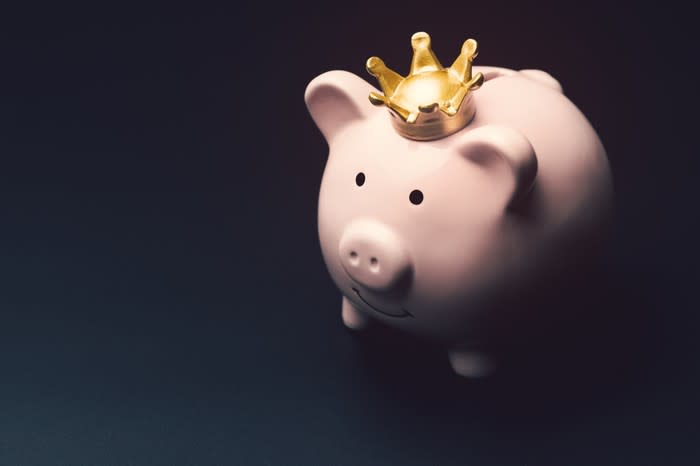3 Dividend Stocks That Should Pay You the Rest of Your Life
Dividends provide a safety net for investors, particularly in uncertain times, and finding a company that pays them and that you can latch onto for a lifetime is rare. Yet these three Motley Fool contributors believe Apple (NASDAQ: AAPL), BP (NYSE: BP), and Hershey (NYSE: HSY) are three such stocks you can grow old with.
Apple's dividend is built to last
Jamal Carnette, CFA (Apple): Due to the slowing smartphone supercycle, Apple investors should no longer expect the company to be the revenue-growth juggernaut it once was. However, dividend investors should put the company on their radar as a dividend growth stock because the company has increased its dividend payout by 10.5% per year over the last three years.

Image source: Getty Images.
Even if Apple's top-line growth continues to slow, there's more than enough cash to pay its dividend for years. As of fiscal Q2 (Q3 will be announced on July 30), Apple's net cash, as defined by cash and marketable securities minus debt, amounted to $113 billion, more than enough to service the current payout of $14 billion for eight years. And it isn't as if the company is significantly cutting into earnings to service the dividend: Its payout ratio is less than 25%.
It's understandable that income investors would overlook Apple -- at 1.5%, it currently trails the S&P 500's yield by almost 40 basis points -- but the company is returning cash back to investors at an unheard-of clip. In the last 7.5 years, Apple has returned $364 billion in capital to its shareholders. In fact, in fiscal 2018, Apple retired 4.8% of their diluted shares outstanding through share repurchases, a de facto dividend. Apple's manageable payout ratio, partnered with its huge cash pile and aggressive share repurchases, point to a dividend that's built for the long term.
Far from a dying industry
John Bromels (BP): A lot of people have asked me lately if it's even worth buying oil stocks. "In 10 years," said one, "it'll be all electric cars and solar panels." So you might be surprised that I'm recommending British oil and gas giant BP as a dividend stock that should pay you for the rest of your life. But it's true: The data suggests that BP will still be around -- and still paying a dividend -- for decades to come.
First, the dividend. BP recently surpassed fellow oil major Royal Dutch Shell as the highest-yielding stock among the big oil majors. The company is currently yielding 5.9% compared to Shell's 5.8%. While that's not a big difference, it gives BP some bragging rights.
BP can also brag about its excellent recent performance and its longtime commitment to paying a dividend. Even during the recent oil price downturn of 2014-2017 and before that, during the Deepwater Horizons oil spill catastrophe, BP continued to pay a quarterly dividend to its shareholders. That shows how important the dividend is to the company.
Of course, you can't pay a dividend if you've gone belly up. But despite recent gains in renewable energy technology and increases in renewable energy's market share, the market share of oil and gas has actually grown. Data from the U.S. Energy Information Agency projects that between 2015 and 2040, liquid petroleum usage (including oil) will increase by 18.9% worldwide, and global natural gas usage will jump by 42.7%. This is expected to happen even as renewable energy usage increases, as well.
Far from going out of business, BP should continue to be a reliable dividend stock for the rest of your life.
A sweet idea for the future
Rich Duprey (Hershey): Confectioner Hershey is no longer the chocolate mess it once was. It beat analyst expectations for the second quarter last month, building on the impressive results notched earlier in the year as its acquired snacks business recorded strong sales and rising e-commerce sales.
Analysts are looking for Hersey to continue growing, too. Revenue is forecast to come in at $2.1 billion in the second quarter, up 2% from the year-ago period, and earnings per share (EPS) are expected to rise 3%, to $1.60 per share. The market has also responded to the better performance and outlook for the chocolatier, with Hershey's stock up 40% in 2019 and up over 53% during the last 12 months.
Even so, the meteoric rise that its shares enjoyed took a pause after its latest financial report because Hershey offered muted guidance for the rest of the year. It's raising prices on single-serve products by 10%, as its own costs have risen, but it says it takes some time for retailers to adjust to the hikes though it doesn't expect any real impact from them.
But the company tempered growth expectations by lowering its own sales guidance for 2019 to 2%, compared to its prior forecast of 3% growth. North America was a surprisingly tepid market for Hershey this past quarter, growing only 0.5%, but analysts at J.P. Morgan think the candy and snacks company was simply being "conservative" in its outlook.
Hershey has paid a dividend every year since 1930 and has a long history of raising the payout -- except in 2009, when it was frozen before resuming again the next year. The dividend currently yields 2% and should last you the rest of your life, unlike one of its Kisses candies.
Jamal Carnette, CFA owns shares of Apple. John Bromels owns shares of Apple, BP, and The Hershey Company. Rich Duprey has no position in any of the stocks mentioned. The Motley Fool owns shares of and recommends Apple. The Motley Fool has the following options: short January 2020 $155 calls on Apple, long January 2020 $150 calls on Apple, short January 2020 $155 calls on Apple, and long January 2020 $150 calls on Apple. The Motley Fool has a disclosure policy.
This article was originally published on Fool.com

 Yahoo Finance
Yahoo Finance 